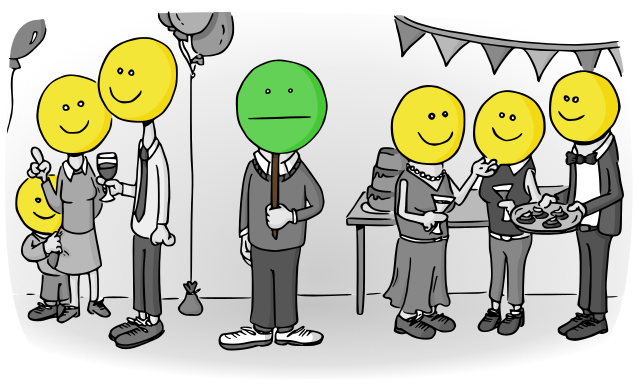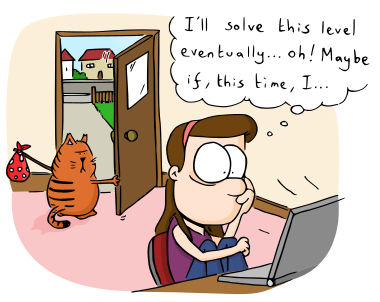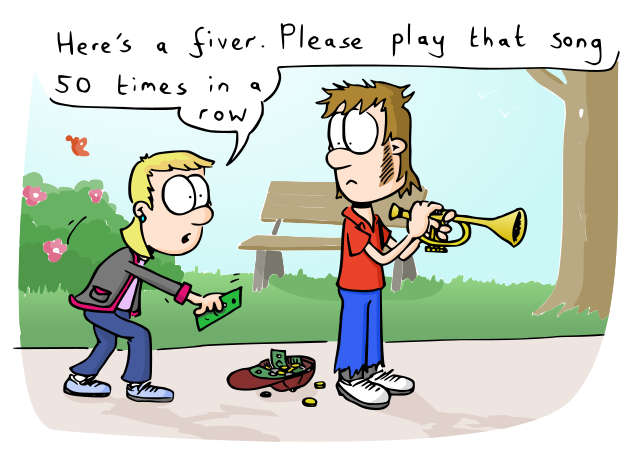Have an Average Day
A.K.A. Screw Perfection
(15-20 min beast)
I’m going to make you an offer. Suppose I had a magic wand. Upon waving it, I could ensure that your days nestled in the region of “a bit above neutral”.
In other words: Not bad. Could be better, but not too bad either. Aside from obvious setbacks or strokes of good fortune… A happiness that erred roughly towards 7 out of 10.
Would you take me up on this offer?
It might be tempting, but equally may seem a daunting prospect. Would you feel comfortable knowing that 9’s and 10’s were now out of reach in all but the most exceptional of circumstances? With the hint that other people around the world could well have acquired a stronger, consistent state of happiness… would a 7 be giving up, selling out and little more than settling?
If your response was “huh, I’m not sure. I kinda seem to get that already”, then you have seen through my little ploy.
Such a spell seems to exist. Your brain was born with the spell book and likely recited its dark incantation long before you probably even remember.

The annoying part is that it likes to point it at things we enjoy. That neat song we like, a pay rise or the latest addition to your wank-bank. It’s not that we stop appreciating them… but they seem to stop creating that all-encompassing sense of completion, causing our beady eyes to look out for the next element to include. In effect, we think “hey, this is pretty good… but you know what will make this even better…?” and then mutter something about variety, life and assorted spices.
I’m sure all of us have been guilty of playing a song or album to death. It takes hold and we attempt to plug our brains directly into the noise, engorging ourselves on the chord progression, impending chorus and subtle hooks… only for it to join the rest of our dusty archive to occasionally be rediscovered with an “oh yeah, I really liked this!” This coming from a guy whose play count of Viva La Vida is well into several thousand and was much the bane of his flatmate’s sanity during university.
It appears that the notion of going for bigger thrills isn’t confined to the world of hard drugs and extreme sports. Tolerance stalks the halls of happiness as well. We appear to adapt to pleasure, hilariously leading to the classic mental hiccups of wanting what you don’t have, thinking the grass is greener and even mid-life crises.
Brickman and Campbell gave this a quirk a name in 1971: “Hedonic Relativism”1 – Hedonism being the pursuit of pleasure and self-interest.
20 years later, Michael Eysenck then gave it a better name: The “Hedonic Treadmill”.

This theory also goes by the names of “Adaptation theory”, “Set point theory” or “My brain is a jerk who moves the goal posts theory”2. It basically suggests that the brain has a default happiness range which it tends to shuffle towards, regardless of what happens. Good and bad events might create a spike which lasts for a number of hours, days or weeks, but the brain will eventually adapt and migrate back to its favourite spot: Somewhere above average. The realm of “Doing alright. Could be better, but doing alright”.3
The classic example are the studies of lottery winners a few months after winning4. Whilst we expect it to unlock bliss, the reality was that the winners were only marginally happier than the control group (4 out of 5 vs 3.82), but also garnered less pleasure from mundane activities than them.5
The specifics are still under debate; the degree to which the point can move, or whether it functions more as a range (or thought of as “guidelines”, for the pirates among us). But one thing seems common: A propensity for the brain to head towards a particular baseline mood.
Now this might seem like the brain being a jerk, but there is likely a purpose to this. A nibbling sense of dissatisfaction is what keeps us improving. Any expert in motivation will be quick to tell you that desire is a fundamental element of getting things done… and you’re not going to desire anything if you’re fully sated (other than perhaps a nap). As a teenager I spent a lot of effort trying to improve my dating and not my woodwork. Guess which one I wasn’t happy with.

So we scratch the itch. We create. We build. We find better ways of doing things. We make music. We push our limits, learn new things and make new connections. And it’s thanks to this that most of us are no longer lurking in caves, throwing sticks at things and being gored by hungry animals on a daily basis. In fact, if you think about it, the device you’re reading this on was likely honed by people who weren’t entirely happy with the means of communication that were previously available.
In an ideal sense, the hedonic treadmill keeps us content with what we have whilst simultaneously pushing us to make things even better.
But of course, as with any quirk of the human brain, it can go wrong if misunderstood or mishandled.
For me, there are 2 biggies.
The first is that we ditch what we have in the fruitless pursuit of a new high. Whether our financial security, family or health… we trade it in for the next big thing. We can become so caught up in the attainment of new, that we stop cultivating what we already have, leading to a never-ending loop of knocking down and rebuilding our own card house. We cycle relationships, jobs, luxuries, hobbies or even countries… never quite being able to settle on one.

The second is that we denigrate ourselves for not being happy enough. Thanks to a diet of happiness gurus and feel-good ramblings, we can mistakenly harbour a dreamy-eyed reality that life can become a consistent string of 9’s and 10’s if only we did the right things – after all, we are apparently “born happy”. Anything less is taken as a sign that we are off-track or lacking purpose. We get a taste of ennui and panic with “well shoot… I don’t feel very fulfilled today. I guess what I’m doing isn’t very meaningful after all.”
So we wallow. We invent “quarter life crisis”. We blame life. We blame social media. We withdraw.
And for what? A misguided notion that perma-happiness is possible. How much misery do we honestly inflict upon ourselves over this?
And that’s the most disheartening thing to see. People living decent lives speak as if they are a failure. I had a colleague who is married, immensely proud of their children, financially secure and enjoys the simple pleasures of good food and good wine… only to speak as if they were lagging behind and not living up to who they could be.
Point me towards this mental imp. Let’s break its teeth.
What can we do about it?
Like most quirks with the brain it’s not about shutting out the problem, but handling it appropriately, which I believe can create a meaningful resolution. We can’t force our brain to not adapt… but we certainly can stop piling on the self-loathing and self-destruction if it does.

Revise your expectations
If your brain tends to gravitate to a 7 out of 10… holding yourself to a standard of 9’s and 10’s is asking for trouble. That’s not to say you shouldn’t strive for them, but expecting it of yourself is what can cause you to unnecessarily self-flagellate over an imperfect day.
What you aim for and what you will accept should not be the same thing.
In other words, learn to accept an average day. If that very term makes your skin crawl, therein lies part of the problem. Every day cannot be above average. Your maths teacher would throw a hissy fit if they heard you suggest otherwise.
But that’s where it gets tricky… what does an average day actually look like? What is a 7 out of 10, to you?
It can be pretty hard to conceptualise. 7 is a very amorphous number that’s hard to pin down. All we know is that it sits somewhere in the region between “neutral” and “perfect”. But what that’s made up of is anybody’s guess.
The other (and more entertaining) problem is that our minds appear to struggle differentiating between ‘average’ and ‘ideal’ when it comes to expectations about ourselves. When one group was asked “how often will you exercise next week?” and another “in an ideal world, how often will you exercise next week?”, the predictions were non-discernible from each other6. Even if you explicitly tell people “we have a strong bias to overestimate our abilities”, the only thing it affects is their estimates for other people7… their own assumptions about themselves remain as inflated as ever. It appears that we are just no good at setting realistic standards for ourselves.

I’ve fallen into this trap – even knowing the above research. In trying to plan an ‘average day’, I basically excluded extravagancies (like a freaking parade) and decided that, so long as the regular stuff went without any problems, that this would all average out to a 7 out of 10. Schmuck.
Unsurprisingly, I could never live up to my “average” day and became frustrated if I missed a train, spilled some coffee or hit a roadblock on a problem at work. “Screw it, this day’s clearly a duff one.”
If, like me, you’ve had some trouble getting a balanced expectation down, try this: Start high and leave room for screw-ups. Assume that 7 out of 10 means that 3 things went wrong. After all, if you buy an album or product and rate it 3.5 stars, that likely means a few things aren’t up to scratch.
So set your average day and leave room for 3 annoying headaches that detract from “hey, that was pretty good”.
What this does is give you a more quantifiable gauge, rather than relying purely on your mood. All too often it’s easy to look to “do I feel happy?” and reading “meh” as something like 2 stars. This also helps stem the frustration at not hitting perfection, also known as “My day! My beautiful day! I was on track for such a perfect day there!”
We can often glamorise the idea of 5 stars or 10/10 to the point that we can forget that doing alright is actually alright. And remember that accepting a 3-flaw day doesn’t mean that you are aiming for one. We can fear that settling for a not-so-good day may somehow encourage more like it or cause us to stop holding ourselves to a higher standard. But not beating yourself up is not the same as openly inviting mediocrity into your house and letting it trash the place.

Don’t panic
At a seminar hosted by Martin Seligman, a somewhat nervous woman raised her hand and mentioned how she had stopped trying to be happy, only to conversely find herself happier as a result.
In speaking to her afterwards we found that, by not worrying about being happy, it shut off the panic response that emerged when a glimmer of unhappiness was spotted on the horizon. Downers stopped becoming a symbol of failure, but merely an occurrence.
Thanks to our inner narrator, we can sometimes read too heavily into a mild sense of dissatisfaction if we permit it to. If we pester it with “goodness, I don’t feel very happy today. What could it be?” the chances are it’ll make up something plausible to shut us up. We can inadvertently invent problems where there are none.
And if you have make-belief problems, then you’re going to end up chasing make-belief solutions.
“But why am I still feeling so down? There must be something wrong!”
No, you’re probably fine. Chances are it’s the hedonic treadmill doing its thing.
Funny thing I’ve found is that, regardless of what I spend my days doing, some days I just feel unfulfilled. Whether I’m helping others, exploring, exercising, writing, working, reading, gaming, eating kale, walking, learning a skill… I sometimes don’t enjoy it. It happens. And I begrudge to admit that, more often than I’d like, I’ve toiled over “I’ve just spent the day doing [x]… but I don’t feel fulfilled. Shoot. I guess this doesn’t have much value then. I’ll have to try something else…”

The key point here is to not associate mood with meaning. If you look to whether feeling blissful or angsty is a sign of the overall value of your day – you’re asking for trouble. It’s about as reliable as believing your relationship to be as strong as the amount of rainfall that day8. One of the more backward notions I’m grappling with is:
You can have a good day even if you haven’t enjoyed it.
This is ultimately what I feel people mean when they say they’re “doing what they love” or “living the dream job”. It’s not that it’s a persistent meadow of happiness. It’s more that what they’re doing is meaningful enough that they’re content having done it even when it makes them grumpy. To them, feeling empty inside on occasions is no reason to stop.
So If you ever hear your imp whisper “goodness, you’re quite far behind” or “is there all there is?” – Don’t take it at face value. Doing this helps stymie the needless worry or pressure that tends to accompany it. After all, it could just be an imp in treadmill’s clothing. (Huh... That image made more sense in my head… ah well…)
Sure, maybe there’s something you can work on or improve. If you happen to see one, take the lesson and be done with it. But don’t stress yourself about looking for a problem, especially as one may not even exist.

Take stock
Being told to practice gratitude makes me want to stab myself with a writing utensil… sometimes other people too if they are nearby and happen to be the one suggesting it.
The problem I’ve found is that it didn’t really make me feel any better. It felt like a lot of nipple tweaking to pretend that everything was peachy. It’d go fine at first, but after a few weeks my mind would eventually butt in:
“I know we’ve had nice food today. But up yours, I’m still annoyed that that jerk hasn’t called us back.”

But that’s not what practicing gratitude is for. Therein lie my mistake.
What I’ve found is that being grateful for what you have isn’t a means to magically make you more cheerful (contrary to what many suggest). It’s a means to greater perspective. It lets you balance the bigger picture of what you do and don’t have… or how well you’re actually doing. In effect, it gives you a second opinion.
Your mood might go “I’m restless. Does this mean what we’ve been doing is meaningless?”, but taking stock of the bigger picture may help your more rational side to come back with “Bitch, please… We’ve made some progress today. And you know damn well the only reason you want a scuba party with dolphins is because you think it’d make a neat story to impress people you don’t actually value the opinions of. So no. We’re not doing that.”
Don’t get me wrong, it doesn’t silence the mutterings that you are being left behind. But it gives you plenty of ammunition to choose whether it’s actually worth following up or not.

Know that you can hold 2 thoughts at once
What I think trips up a lot of people is the idea that “being satisfied with what you have” and “wanting more” cannot co-exist. They feel that they can be so much more… but mistakenly use this to believe that they are therefore not good enough. But the mere fact that something can be better does not automatically make you a failure until you reach it.
I’m serious. You don’t have to hate yourself in order to strive for more. The fact that you might not be overjoyed with what you currently have doesn’t leave “hating everything you have” as the only remaining option. It’s rarely that black and white.
I think this is the gist of the whole “enjoying the journey” spiel: It’s realising that you can entertain both thoughts at once. You can be proud of how far you’ve come and still want to go further. To think one does not cancel out the other.

Welcome it
As mentioned earlier, the hedonic treadmill has given rise to many of things we enjoy today. You can’t enjoy good music without some poor sod having felt the burning need to create the ultimate riff for the sake of their sanity.
Self-improvement is, by no means, a bad thing. The penchant for seeking (and enjoying) fresh experiences or new and exciting opportunities should be very much welcomed. Some philosophies are big on the idea of cutting yourself from such attachments (believing their pursuit to be damaging), which I feel is well-meaning but a step too far in the other direction. It’s the philosophical equivalent of having a crummy relationship and writing off all [gender] as unreliable and hurtful. And when do we ever listen to those people?
Where those philosophies appear correct is that it’s problematic when you chain your entire happiness to a pleasure or secretly believe that you can link enough together to create an eternal conveyor-belt of joy. If you promise yourself that this is the final piece of the happiness puzzle… you’re screwed. Or worse, you don’t even care why you want it, but just do. Once you inevitably adapt and it no longer serves as the missing piece, you can find yourself feeling cheated, burned out and desperate for more. The dark secret with attainment is that its pleasure can be fleeting. I have often found (and, much to my relief, others too), that my first thought upon success is less euphoric and more a deflated “ok, what next?”9
Aside from a few lifelong pursuits (namely good health, good job and a strong relationship), most pleasure appears to have a limited shelf life. But that’s no reason not to enjoy them at all. The trick is to enjoy things for the sake of enjoying them, knowing that it’s fleeting and not because you’re hoping that it can solve some underlying dissatisfaction. Because most of the time, it won’t.

Taking this stance ultimately aims to make pleasures a “nice to have” as opposed to a “must have”, which can make their short lifespan more palatable. More importantly, it prioritises them appropriately. If you know it’s just a “nice to have”, you’ll be less inclined to ditch important things compared to if you thought “I must have that!”
Because, as far as I’m concerned, there’s nothing wrong with going after those 9 and 10 moments. They’re great when they occur! But I feel it’s also good to be comfortable with knowing that we’re also going to be nowhere near them for the most part. Unless we enjoy the process that leads us to a new experience, it will be worthless once we get there.
And that, I feel, is the secret to winning on the hedonic treadmill. It’s pacing your run so that it is, at the very least, bearable. If you’re stuck with little more than ephemeral 9’s and 10’s, then you might as well be cool with the process of jogging after them. And that, fundamentally, means making peace with your time in the misty realms of 7.
There’s nothing wrong with chasing highs as long as you aren’t wrecking parts of your life in the process.
Good luck, have fun and have an average day.


 Squid and Whimsy
Squid and Whimsy

